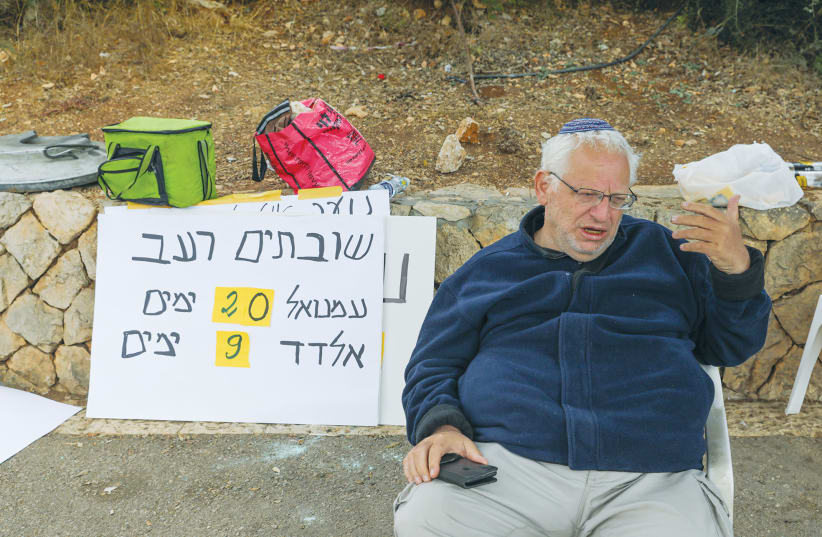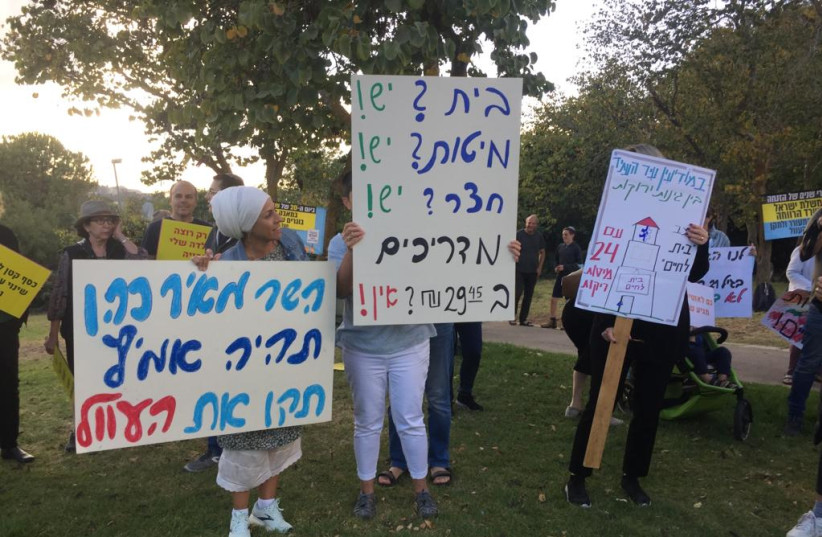Emanuel Cohen is not a young man anymore. On Monday, the 20-day hunger strike he is leading, and the 20 nights he has spent on the ground in a small scout tent near the Knesset, were clearly etched on his face and dried-out lips. Nevertheless, his blue eyes behind glasses narrate his determination to win this battle.
A recently elected member of the Ginot Ha’ir local council board, the 56-year-old Cohen is fighting for better and more humane conditions for low-functioning autistic persons, like his 22-year-old son Yiftah.
Cohen has managed to bring together parents from across the country who face, as he did until less than a year ago, the agony shared by young adults with special needs like his son.
What Cohen and the other parents require is an additional budget from the Labor, Social Affairs and Social Services Ministry that will provide better employment programs tailored to those with special needs.
“When we talk about human rights, and when we think of the Basic Law of Human Dignity and Liberty, clearly these frameworks say that our children are not considered as human beings who deserve their human dignity to be respected,” asserts Cohen, sitting in a folding plastic chair, the kind you take to the beach – which, he adds, is not particularly good for his back. “We have a lot of associations and NGOs working hard to improve and protect the human rights in our country, and I ask, what about our children’s human rights? Don’t they deserve attention to their special needs?
"We hear about the violation of human rights in China, in North Korea – what about the total neglect of our children? Have they done something wrong? Is it their fault that they have special needs? That is what I am fighting for.”
There are about 800 to 1,000 young adults defined as low-functioning autistic. Over the years, the Education Ministry, which is in charge of their curriculum until age 21, has changed its attitude and care, providing educational frameworks across the country that contribute to improving their intellectual condition according to their abilities.
“But once they reached age 21, everything is stopped,” notes Cohen. “They move to the authority of another ministry, and then are offered employment frameworks according to their capacity. But these are in fact long days of doing the same routine activities – debilitating, terribly boring, pointless activity that does not create minimal stimulation and deteriorates their already low capacities greatly. It’s a shame, it shockingly indicates simply criminal neglect of the system. The ministry doesn’t care, the ministers do not care. Of the MKs, only a few care.
“The government, all of them, simply don’t care, and our children and our families too, are tossed aside as if we were a nuisance to be kept away.”
What Cohen wants to obtain is the alternative framework he and his family have managed to create, with the participation of several bodies in the city, to implement wherever there are young adults with these special needs. Cohen mentions that in the inappropriate institutions operating now, too often the only solution facing these disabled persons is to feed them psychiatric drugs.
The framework created by Cohen’s family offers these young adults a large variety of activities, from animal treatment to horse riding to preparing their own breakfast.
A few donations, participation of the families, and enlarging the scope of activities located in Kibbutz Ramat Rahel show that even with limited budgets and a strong will and engagement, things can be changed for the better. They are various activities with the seniors of the kibbutz: they celebrate the holidays with the community, they enjoy volunteer activities, and above all, there is a staff that is rewarded for their very significant work with a commensurate salary.
“There are two issues in our struggle,” says Cohen. “First to move the establishment – the ministry, the Treasury, and all the agents involved in such a decision – to create such frameworks as the one we created here.
“When my son reached the age of 21, and the educational framework ended, my wife and I went to see what solutions (out of the family home) the state offers to these young adults. We were horrified by what we saw, and my wife swore she would never put our son in such a place. That is why we worked on an alternative solution, and my son is fine now. But I am here for the others, the hundreds of young low-functioning autistic people who are doomed to a life of boredom and apathy that persists in irrelevant frameworks and attitudes to their needs. This is something I, with all the parents, am totally dedicated to changing.”
BUT THERE is more. Cohen says that as long as the staff working with these low-functioning autistic individuals is underpaid, or paid at just the basic rate, quality employees will not be encouraged join the staff.
“If you have a boring and unstimulating employment framework, and a staff that does not meet the highest standards one should expect in these places, what do we expect from these people?” he says. “It’s not easy to take care of a low-functioning autistic, you need not only the professional skills but also the motivation of a decent salary. If these two things do not exist, what do the authorities expect will happen? It is as if they wait for our children to deteriorate further in inability and inaction, and I ask again, why? Aren’t they human beings with a right to dignity and proper care?”
What made Cohen so angry that he decided to go on a hunger strike?
“Even if we get carried away with a very broad estimation of the cost of what we ask for, we will reach the maximum of NIS 39 million per year. Considering the amount of public money used and misused in our country, this is an almost negligible amount, and therefore I say that refusing it is simply a crime against our children who did not commit any sin.”
Eldad Oryan, the father of a young, low-functioning autistic daughter from Petah Tikva, joins the conversation. He is also on a hunger strike with Cohen, with his own small tent nearby. Unlike Cohen’s son, Yiftah, Oryan’s daughter Noa does not yet benefit from an alternative institution.
Oryan came to Jerusalem to strike with Cohen hoping to obtain the attention of the ministry to change the situation he describes as “unbearable.”
Inquiries to the Labor, Social Affairs and Social Services Ministry spokesman were unanswered at press time.

